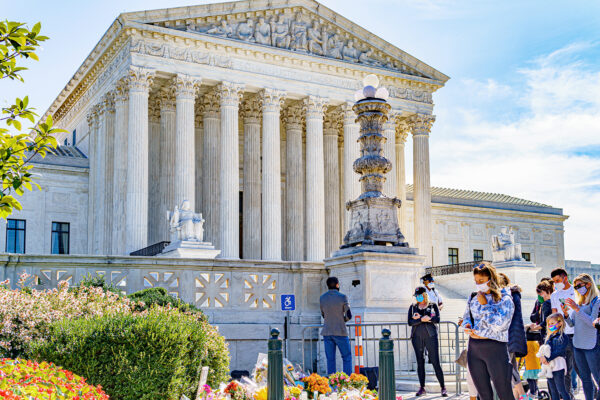
The death of one Supreme Court justice shouldn’t plunge the whole country into crisis. The fact that Ruth Bader Ginsburg’s has is more proof that America’s top court is too powerful.
In no other democracy does the highest court feature so prominently in the public imagination.
Here in Catalonia, Spain’s Supreme Court is controversial for consistently ruling against Catalan interests, but I doubt many Catalans know the names of individual Supreme Court justices. Certainly the average Dutch person or Italian doesn’t.
Even in Poland, where the ruling far-right party has created a parallel legal system to sideline a Supreme Court it considers to be dominated by liberals, the fate of individual justices doesn’t provoke such strong emotions as in the United States.
American justices have been aware of the danger. Antonin Scalia, a conservative, cautioned a year before his death in 2016 that America could find itself governed by a “black-robed supremacy” unless its rediscovered its tradition of “self-rule”.
Usurpers
It’s not that justices have been keen to usurp power once held by the people, states or Congress. It’s that Congress has refused to legislate on controversial issues.
If it had passed a law regulating abortion rights in the 1970s, the Supreme Court would never have had to decide Roe v. Wade and triggered a fifty-year culture war.
The Supreme Court has since ruled on everything from affirmative action and collective bargaining rights to gay marriage and gun control, decisions that in any other democracy would be made by the legislature.
End run
Commentator Megan McArdle has blamed Americans in both parties who “want to do an end run around the legislation process by getting unelected judges to declare their particular concerns beyond the reach of legislators.”
Why bother tediously lobbying senators and representatives when you can simply win the White House, appoint a few judges and get them to transform your most ardent desires into untouchable rights?
Paul Waldman puts more blame on Republicans, arguing that they decided there are rules and norms and that, while rules need to be followed, norms can be ignored whenever doing so advances their political interests.
Or, as Frank Bruni puts it in The New York Times, “To the cheaters go the spoils.”
Rules?
When Scalia died during the last year of Barack Obama’s presidency, Republicans refused to confirm Merrick Garland as his replacement, arguing that no appointment should be made so close to an election. Now that a liberal justice has died even closer to an election, Republicans seem to have forgotten their own invented rule.
Republicans eliminated the Senate filibuster to put Neil Gorsuch on the Court in 2017, despite strong Democratic opposition, and rushed through the nomination of Brett Kavanaugh in 2018, despite accusations of sexual assault and unanimous Democratic opposition.
The last time Republicans won the popular vote in a presidential election was 2004, yet they could control the Supreme Court for another generation — and use that power to impose their reactionary views on an increasingly liberal country.
Legitimacy
This puts the Court at risk. McArdle warned that politicizing the judiciary would:
- Needlessly federalize issues when only devolution can hold a continent-spanning country like the United States together (David French makes the same argument in his newsletter);
- Radicalize those on the losing end of judicial decisions if they feel they have no democratic recourse; and
- Undermine the legitimacy of the courts if they are no longer accepted as neutral arbiters.
Jason Willick has similarly argued in The American Interest that highly politicized confirmations could undermine the Supreme Court’s pretension to be immune from temporary political passions:
Meanwhile, the same congressional gridlock that makes it so hard to confirm justices would thrust more political authority into the Court’s lap.
This is a dangerous combination for an institution that relies on others to enforce its will.
Solutions
There are solutions.
- Ideally, Congress would do its job and legislate, so that the courts would no longer have to take sides in America’s culture war.
- Term limits, rather than lifetime appointments, could lower the stakes.
But neither is likely to happen so long as one party relies on the Supreme Court to overrule the popular majority.
